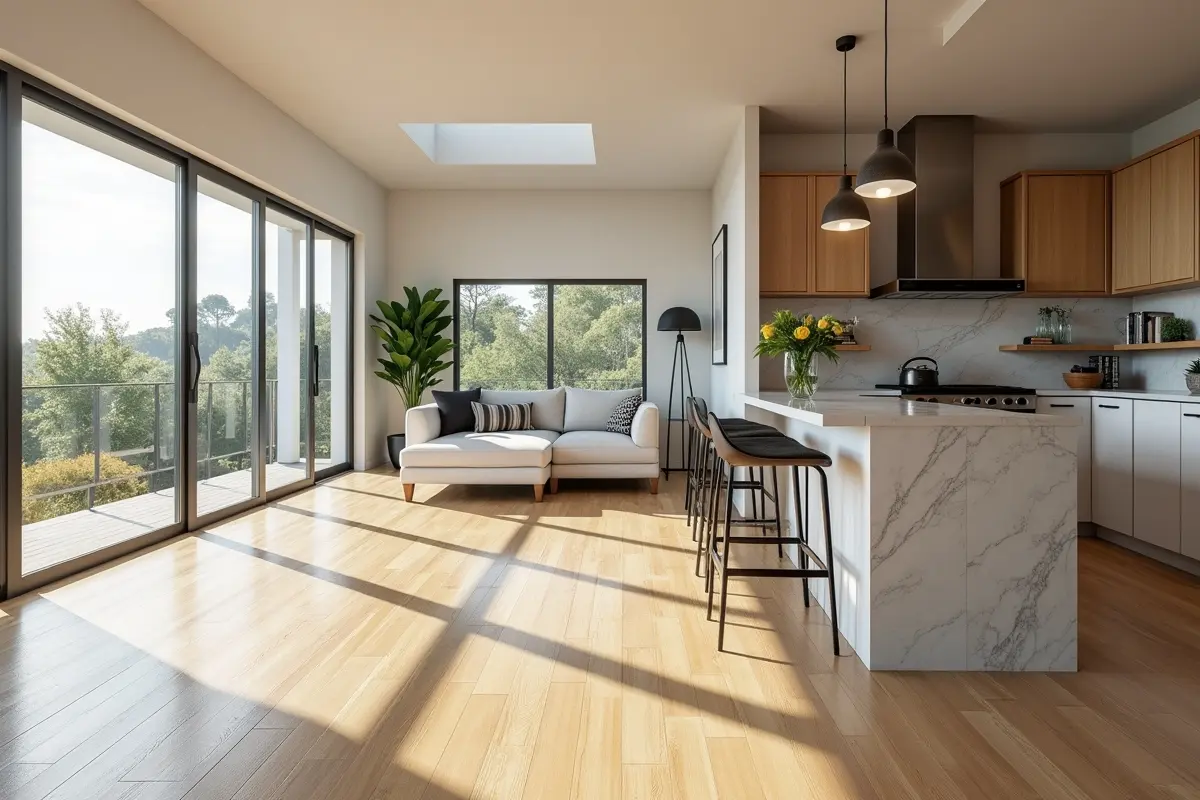Durable Surfaces Designed for Daily Living
Your home works as hard as you do. Every day, surfaces throughout your living space endure spills, scratches, heat, and constant use. The difference between a home that looks worn after a few years and one that maintains its beauty lies in choosing the right materials from the start.
Durable surfaces aren’t just about longevity—they’re about creating spaces that look great while handling whatever life throws at them. Whether you’re renovating your kitchen, updating your bathroom, or designing a new home, understanding which materials can truly stand the test of time will save you money and frustration down the road.
Kitchen Countertops That Handle the Heat
The kitchen is ground zero for surface abuse. Hot pans, sharp knives, acidic spills, and daily meal prep create the perfect storm of potential damage. Smart homeowners invest in materials that can handle this punishment without showing wear.
Quartz engineered stone leads the pack for kitchen durability. Unlike natural stone, quartz doesn’t require sealing and resists stains, scratches, and heat damage. Its non-porous surface prevents bacteria growth, making it ideal for food preparation areas.
Granite remains a popular choice for good reason. This natural stone withstands heat exceptionally well and develops a unique patina over time. With proper sealing every few years, granite countertops can last decades while maintaining their distinctive appearance.
For budget-conscious homeowners seeking durability, solid surface materials like Corian offer excellent value. These synthetic materials resist moisture, can be repaired if damaged, and come in countless colors and patterns.
Flooring Solutions Built to Last
Floors take more punishment than any other surface in your home. The key to long-lasting floors lies in matching the material to the room’s specific demands.
Luxury vinyl plank (LVP) has revolutionized durable flooring. Modern LVP mimics hardwood or stone while offering superior water resistance and scratch protection. Its multi-layer construction includes a wear layer that protects against dents, scuffs, and fading.
Porcelain tile excels in high-moisture areas like bathrooms and kitchens. Unlike ceramic tile, porcelain is fired at higher temperatures, creating a denser, less porous surface. Large-format porcelain tiles reduce grout lines, minimizing maintenance while creating a seamless look.
For areas where comfort matters as much as durability, engineered hardwood provides the warmth of real wood with enhanced stability. The multi-layer construction resists expansion and contraction better than solid hardwood, making it suitable for basements and areas with fluctuating humidity.
Cabinet Surfaces That Withstand Daily Use
Kitchen and bathroom cabinets face constant handling, moisture, and cleaning products. The cabinet surface material determines how well they’ll look after years of use.
Solid wood cabinets, particularly those made from hardwoods like maple or cherry, offer unmatched durability when properly finished. The natural strength of wood fibers resists dents and scratches while developing character over time.
Thermofoil cabinets provide excellent moisture resistance at a fraction of solid wood’s cost. The vinyl coating over MDF creates a smooth, cleanable surface that won’t peel or chip like painted cabinets might.
For homeowners considering Salt Lake City kitchen cabinets, local climate conditions make moisture-resistant finishes particularly important. The area’s temperature fluctuations and seasonal humidity changes can stress cabinet materials, making quality surface treatments essential.
Laminate surfaces have evolved far beyond the basic options of decades past. High-pressure laminate now offers realistic wood and stone patterns while providing superior stain and scratch resistance.
Bathroom Surfaces That Combat Moisture
Bathrooms present unique challenges with constant humidity, temperature changes, and exposure to cleaning chemicals. Surfaces must handle moisture without warping, staining, or developing mold.
Natural stone tiles like travertine and marble create luxurious bathrooms but require proper sealing and maintenance. For similar aesthetics with less upkeep, porcelain tiles that mimic natural stone offer the best of both worlds.
Solid surface shower surrounds eliminate grout lines where mold and mildew typically develop. Materials like cultured marble or solid surface composites create seamless installations that are easy to clean and maintain.
Glass tiles resist moisture completely while reflecting light to make bathrooms appear larger and brighter. Their non-porous surface prevents bacterial growth and requires minimal maintenance.
Maintenance: The Key to Longevity
Even the most durable surfaces need proper care to reach their full lifespan potential. Simple maintenance routines can extend surface life by decades.
Clean spills immediately to prevent staining, regardless of the surface material. Use appropriate cleaning products—harsh chemicals can damage even durable materials over time.
Establish protective habits like using cutting boards, trivets for hot items, and coasters for drinks. These simple steps prevent most surface damage before it occurs.
Schedule professional maintenance when needed. Sealing natural stone, refinishing hardwood, and deep cleaning grout lines maintain surfaces in peak condition.
Building Spaces That Last
Choosing durable surfaces isn’t about finding the most expensive materials—it’s about selecting the right material for each application. Consider your family’s lifestyle, the room’s function, and your maintenance preferences when making decisions.
Quality installation matters as much as material choice. Even premium materials will fail if improperly installed. Work with experienced contractors who understand proper preparation and installation techniques.
Your home should support your daily life without constant worry about damage or wear. By investing in truly durable surfaces designed for daily living, you create spaces that maintain their beauty and function for years to come.

